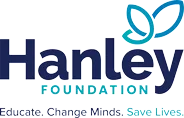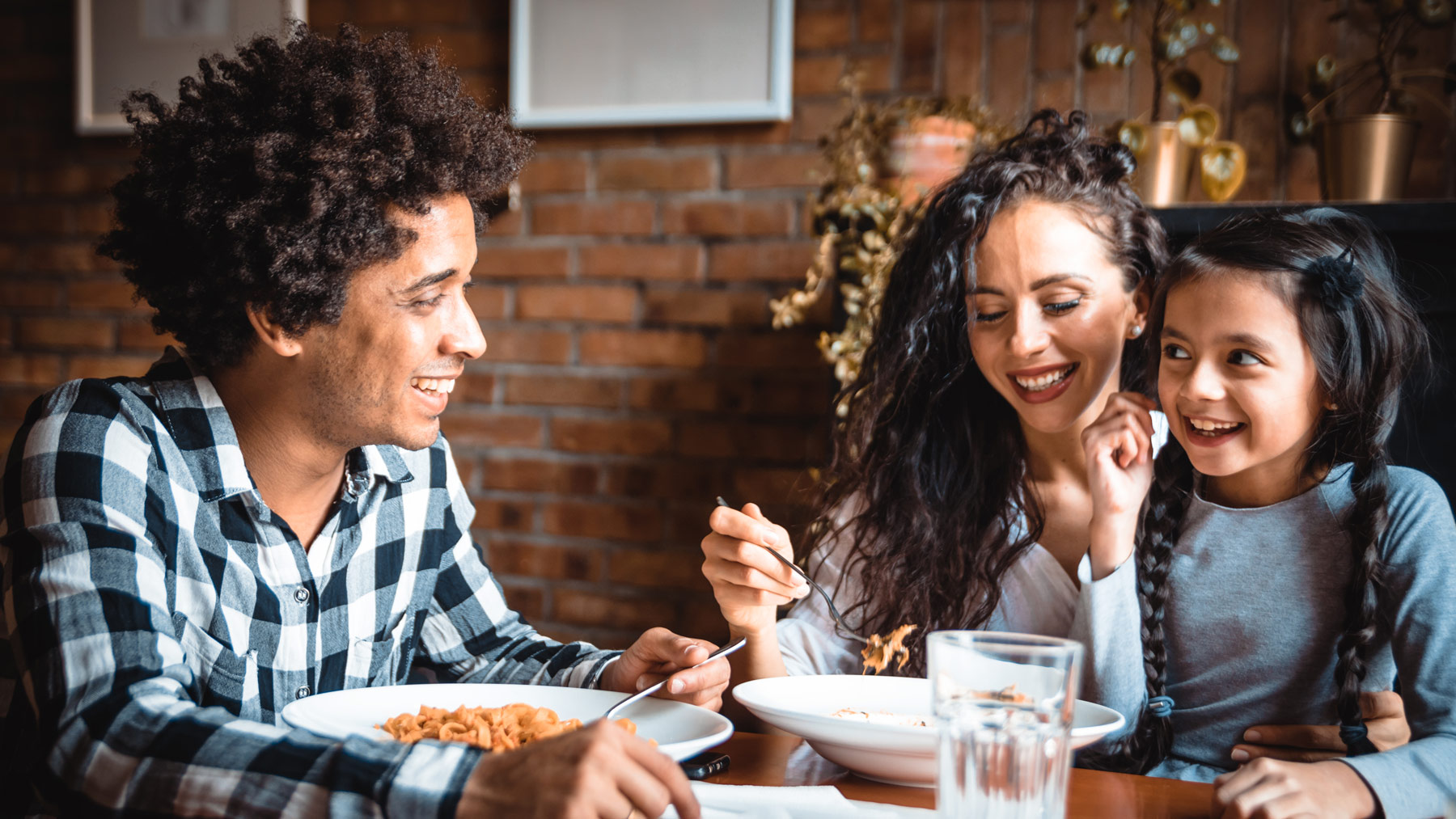By Dr. Rachel Docekal, MBA, Ed.D. – CEO of Hanley Foundation
The effects of a loved one’s addiction are challenging for the entire family, but there is hope for healing. Addiction can be particularly difficult for children to understand, making age-appropriate ways to talk to children about addiction critical in helping your family navigate difficult circumstances without creating additional stress. In this article, we will guide you in discussing addiction with your child in a way that is open, honest, and authentic.
Communication will help decrease your child’s uncertainty and fear surrounding their loved one’s addiction. If you think the child is unaware of the addiction, please know they feel the stress, instability, and unpredictability that’s going on in the family, even if they can’t name it. As you navigate the conversations (yes, conversations, what’s best for children is consistent support versus a one-and-done conversation!), remember to listen, listen, listen, and take your cues from the child. Talking to children about addiction and answering children’s questions takes effort; please know that Hanley Foundation is here to help.
Navigating Discussions About Addiction with Children
Conversations about a parent or loved one’s addiction with a child feels challenging and can evoke strong emotions and uncertainty. First, reassure the child that s/he can “Love your (mom, dad, etc.) but hate the addiction.” Children feel a natural conflict between their love for the individual and the behaviors associated with the addiction. The renowned children’s therapist, author, and public speaker Dr. Jerry Moe, who works with Hanley to create family programming designed for children, created “The 7 C’s”. These are an excellent framework to talk to children about addiction.
The 7 Cs
You didn’t Cause the problem.
You can’t Control it.
You can’t Cure it.
But…
You can help take Care of yourself.
You can Communicate your feelings.
You can make healthy Choices.
You can Celebrate yourself!
Eliminating Guilt and Responsibility
Children of all ages need to be reassured that they are not responsible for their family member’s addiction. You will want to emphasize that they bear no blame and should feel no shame (a younger child may not understand these words). These are the first three C’s – you didn’t cause it, you can’t control it, and you can’t cure it. Addiction is a disease. Reassure the child that they should not feel shame because of a loved one’s disease.
Helping Children Feel Loved in the Face of Addiction
Reassure children that their parent loves them – and that it’s ok to love their parent while hating the addiction. When the loved one is in treatment or recovery, the child might wonder why that person is not home. Dr. Moe recommends comparing treatment and meetings to school. Children can relate to going to school, and it makes meetings seem familiar. “Meetings are like school. Mom has to go to meetings the same way that you have to go to school.”
Encourage Open Communication
Create a setting where children feel comfortable expressing their thoughts and worries and encourage open communication to help them better understand and manage their emotions. One of the easiest ways to cultivate open communication is by eating meals together without the television, smart phones, or any other electronic devices. Ask the child open-ended questions, such as “What are you really good at?” or “If you were an animal, what would it be?” Then, when the child has a question or you want to discuss a loved one’s addiction, communication will be more natural and less scary for the child.
Providing Educational Resources
Provide age-appropriate materials or tools to help children understand addiction. The old school thinking of “Just Say No” does not work. Children are smart and intuitive. If the child is young, introduce them to the Sesame Street character, Karli. Karli is a 6-and-a-half-year-old green Muppet with yellow hair. She shared with Elmo and other friends that her mother has a “problem” and is in recovery. Sesame Street’s website has beautifully written episodes to help young children understand addiction, treatment, and recovery.
NACOA (National Association of Children of Addiction) is a tremendous organization run by Denise Bertin-Epp. It is dedicated to eliminating the adverse impact of alcohol and drug use on children and families. NACOA has a number of resources for older children and teens.
Hanley Foundation’s Child-Centered Family Program
To further support families navigating addiction, Hanley Foundation offers a free, three-day Child-Centered Family Program designed specifically for children ages 7 to 12 who have been impacted by a family member’s substance use disorder. In partnership with the NACoA, this program provides a safe, nurturing environment where children can explore their feelings, learn age-appropriate coping skills, and connect with peers who share similar experiences. Through therapeutic activities, games, and guided discussions, children gain understanding and resilience while learning that they are not alone—and that none of this is their fault. We encourage families to reach out to learn more about how this powerful program can help their child begin their own path to healing.
Dealing with a Child Sharing Family Matters in Public Spaces
It’s important that I begin this section by stating that addiction is a disease. Individuals with the disease of addiction cannot, “just stop.” Just as we would not feel shame in discussing a cancer diagnosis, we should not feel shame about addiction. Children take their cues from their trusted adults – when we stop feeling shame, so will they. Children need to get open, accurate communication. Encouraging children to share questions at home can ensure they will be met with straightforward, compassionate responses. Do not reprimand or discipline a child who expresses feelings or asks questions about addiction outside the home. Instead, lean in. Provide alternate means for children to express their feelings, such as sketching or journaling, and create safe, open spaces (like at mealtime) where children can express their feelings and ask questions.
Your Child Asked a Question You Don’t Know How to Answer
Understand that every caregiver finds themselves in this situation. If you are not sure how to answer…don’t. Instead, do one or all of the following:
- “Say, that’s a good question. I’m not sure of the answer. What I know is that your (mom, dad, etc.) loves you very much, and so do I. Let me think about it, and we can talk about it tomorrow night.” The NACOA website has resources that will help you answer the questions and discuss addiction with your child in a way they can understand.
- If your child is young, say, “What do you think Elmo and Karli would say?” and watch the Sesame Street Episodes together.
Sleepovers and Safety Concerns
Navigating the safety concerns of having a family member with addiction includes difficult decisions, such as restricting sleepovers or stays with relatives who are in active addiction. The child’s safety is the most important factor. It is up to you to advocate for the child no matter how difficult that is within the family dynamic. Safety becomes a top responsibility in protecting children from danger and unanticipated situations. Instead, look for opportunities for the child (with you if possible!) to spend time with the loved one that are safe. Breakfast at a favorite restaurant on the weekend, for example. Meet in the early afternoon at the zoo or the science museum. If you have to address the situation directly, say to the child, “I love you so much. More than anything, I want to keep you safe. We have talked about how (name) has the disease of addiction. It’s a better choice to meet (name) at the (place) instead of having a sleepover.”
Seeking Help for the Loved One
Encouraging a loved one to seek treatment for addiction is an essential step toward recovery and healing within your family. Providing consistent family support can make a huge difference in their journey—from beginning treatment to completing recovery goals. It’s not just children who can love the individual and hate the addiction – you can, too.
Hanley Foundation is a valuable resource for those with substance use disorders and co-occurring mental health concerns. Hanley provides comprehensive care using evidence-based approaches, ensuring that patients receive the individualized support they require for long-term recovery. Hanley’s services emphasize the importance of family support in the healing process, allowing the whole family to heal together.
When a loved one refuses to seek addiction treatment, it is critical to approach the conversation with kindness, understanding, and LOVE. You may be surprised to know that it is common for those who need help most to be resistant, at least initially. It will help if you remember that’s the addiction talking. Encourage open discussion, demonstrate care for their well-being, and emphasize the possible benefits of treatment on their lives, creating an environment where they feel supported and encouraged to take the required steps toward recovery.
Also, it is essential to remember that everyone in a family is impacted by addiction, and everyone deserves healing and recovery. Always be sure to select a program that has a robust family program. At Hanley, we recognize that treating addiction without the whole family is like trying to fix a broken clock by giving it a coat of paint.
Hanley Foundation is devoted to reshaping the narrative of addiction through prevention, advocacy, treatment, and recovery. As Florida’s largest prevention service provider, we have positively impacted Florida’s communities through our comprehensive prevention education programs. Our treatment programs, Hanley Center and Headwaters, offer private, confidential, and personalized addiction and mental health care in a tranquil tropical setting that promotes healing and recovery.



